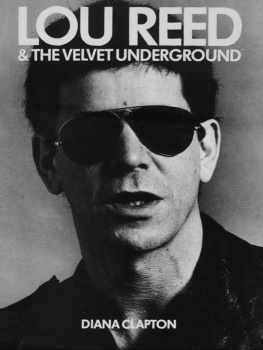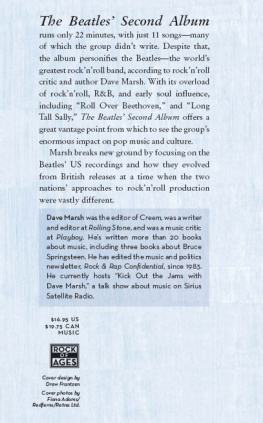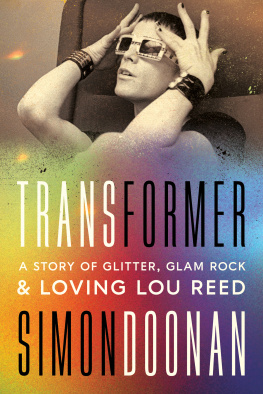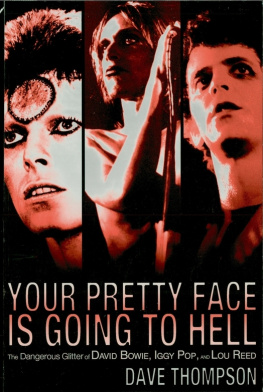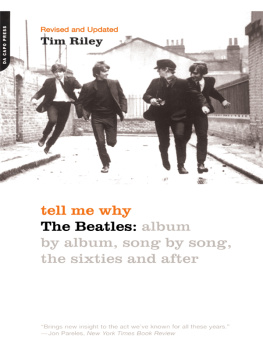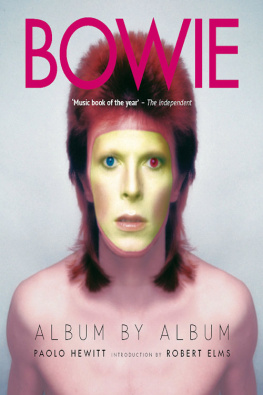
Transformer
Praise for the series:
It was only a matter of time before a clever publisher realized that there is an audience for whom Exile on Main Street or Electric Ladyland are as significant and worthy of study as The Catcher in the Rye or Middlemarch... The series... is freewheeling and eclectic, ranging from minute rock-geek analysis to idiosyncratic personal celebration The New York Times Book Review
Ideal for the rock geek who thinks liner notes just arent enough Rolling Stone
One of the coolest publishing imprints on the planet Bookslut
These are for the insane collectors out there who appreciate fantastic design, well-executed thinking, and things that make your house look cool. Each volume in this series takes a seminal album and breaks it down in startling minutiae. We love these.
We are huge nerds Vice
A brilliant series... each one a work of real love NME (UK)
Passionate, obsessive, and smart Nylon
Religious tracts for the rock n roll faithful Boldtype
[A] consistently excellent series Uncut (UK)
We... arent naive enough to think that were your only source for reading about music (but if we had our way... watch out). For those of you who really like to know everything there is to know about an album, youd do well to check out Bloomsburys 33 1/3 series of books Pitchfork
For reviews of individual titles in the series, please visit our blog at 333sound.com and our website at http://www.bloomsbury.com/musicandsoundstudies Follow us on Twitter: @333books Like us on Facebook: https://www.facebook.com/33.3books
For a complete list of books in this series, see the back of this book
Forthcoming in the series:
24 Hour Revenge Therapy by Ronen Givony
In on the Kill Taker by Joe Gross
Okie from Muskogee by Rachel Rubin
Peepshow by Samantha Bennett
Boys for Pele by Amy Gentry
Switched on Bach by Roshanak Kheshti
Return to the 36 Chambers by Jarett Kobek
Tin Drum by Agata Pyzik
Jesus Freak by Will Stockton and D. Gilson
The Holy Bible by David Evans
Southern Rock Opera by Rien Fertel
Golden Hits of the Shangri-Las by Ada Wolin
The Wild Tchoupitoulas by Wagner
Diamond Dogs by Glenn Hendler
One Grain of Sand by Matthew Frye Jacobson
Southern Accents by Michael Washburn
and many more
Transformer

Ezra Furman

Contents
Let me clear the air from the outset: I dont think Transformer is the greatest record ever made. I dont think its the greatest record of the seventies. I wouldnt even pick it as the greatest album of 1972. After all, both Pink Moon by Nick Drake and Sail Away by Randy Newman were released in 1972 and those are perfect albums. Even if you restrict your search to the best rock n roll album of that year, most would probably turn to the Rolling Stones Exile on Main Street or David Bowies The Rise and Fall of Ziggy Stardust & the Spiders From Mars . If youre looking for a worshipful chronicling of Transformer s creation and unassailable greatness, you got the wrong book. Im here to break the news that most peoples favorite Lou Reed solo album is a deeply flawed work that is disappointing in multiple wayscertainly not the greatest record ever made. But the reason I keep returning to it, even more so than for the pleasure afforded by its best moments, is that its interestingly disappointing. Transformer s failings as an album fascinatingly parallel the failingspersonal and artisticof the man whose name it bears. And Lou Reed is one of the most compelling figures in the rock music canon, not despite his weaknesses, but because of them.
Usually, whether or not you like a record is a simple matter. You can tell as soon as youve heard it. If you like it, you re-listen to it, you talk about it, etc.; if you dislike it, though you might verbally trash it with your friends for a while, pretty soon you move on and forget about it. But then there are certain records where you cant quite decide, records that provoke a reaction that somehow contains both shades of I adore this and Im not interested. Its not that these records are of middling quality, or that they strike me as average. No, these occasional records that float ambiguously out of the range of my ability to coherently react to them really bother me. At the same time that they make me want to love them, they prevent me from doing so by failing to live up to the promise of their better moments.
Its an uncomfortable place to be for a lot of music fans, especially the ones who make a point of having strong opinions about what they listen to. Part of the most commonly invoked archetype of the music collector is that she compulsively categorizes, ranks, and evaluates. When we run into work that provokes in us an ambiguous reaction or is resistant to categorization, many of us are repelled. Not knowing how to take it, we set it aside in favor of music we understand in a more direct way. But once in a while, we end up obsessed, listening and re-listening as though trying to crack its secret code.
Transformer is one of these albums, and for me, it is its ambiguity that elevates it beyond simply being a good record to make it an utterly unforgettable one. What sets Transformer apart is that ultimately the whole album is in fact about ambiguity, and the process of becoming rather than being. It is so uncategorizable in every aspect that even to call it uncategorizable is to suggest a framework that reductively pigeonholes the record. After all, there are plenty of legitimate categories fans use: a glam rock album, an early punk album, a commercial breakthrough, an album about sexuality or genderbut the thing is that Transformer actively aims to land neither inside nor outside any of these categories; not fully. It will inhabit a label for a moment, long enough for you to think you can call it that, and then it will destabilize that label and sneer at you for using it. It is thoroughly noncommittal, a work that, like its author, is so concerned with becoming, transforming, that it doesnt have time to actually fully be anything.
In the end, this is what makes it so exciting. If you spend time with Transformer , it turns out to be an album about total freedom, a rejection of all terms and categories, a declaration of independence from anything and everything you thought you had to say about it.
And thats why its the greatest record ever made.
***
Another thing to keep in mind while you read this book: I love Lou Reed. Ill act all cool and detached in a lot of these pages; Im going to display some harsh skepticism and poke holes in Reeds overblown mythos and call him names. Dont be fooled. Im a desperately fascinated Lou Reed fan, and I cannot get enough of him. Im of the incorrigible type whose obsession expands beyond the music and attaches to the artist personally, as if to really know this person would answer deep, urgent questions about myself. I listen to and think about Reed like an adopted child might search for his biological father: first wondering, then researching, then going on a journey to find him, but never reaching the satisfaction that would come with really knowing the absent man who gave him life. I have found my fathers old address, his records, his interviews, his life story. I even got to meet him once when I was twenty-one. But truly knowing him remains out of reach.




